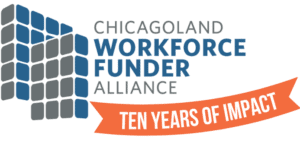For the past year CWFA has been celebrating our first decade by lifting up the partners behind some of the most impactful projects and initiatives we have supported. I have been so proud to see the work of these amazing organizations and leaders featured in our Learning Communities, in videos, and in this newsletter. As we look ahead to 2023, I am even more excited to see where we go from here. To elevate a few highlights, I want to bring some attention back to a project we helped lead with PolicyLink in 2020, which resulted in the report: Advancing Workforce Equity in Chicago: A Blueprint for Action created thanks to the support of the National Fund for Workforce Solutions and JPMorgan Chase. The Blueprint had four major recommendations (p. 61), and in 2023 CWFA will be pursuing all of them in some way, they are:
- Elevate and amplify worker voice and worker power: This year our partners at the University of Illinois Project for Middle Class Renewal will be updating their nationally recognized curriculum for worker’s rights in workforce development, thanks to dedicated funding from the Polk Bros Foundation. This is a key strategy of our Fund for Workers Rights, which has an objective of making worker rights inseparable from the very concept of career readiness. CWFA believes that no student and no workforce development participant should be considered “career ready” without having a fundamental understanding of their rights as a worker.
- Use sector based workforce development strategies to build pathways into good jobs for workers of color: One of the most exciting developments for CWFA in 2022 was the critical role that the Network of Employer-Led Workforce Solutions (NEWS) played in bringing an $18.5 M EDA Good Jobs Challenge grant to our region. NEWS is an endeavor CWFA shares with Cook County, World Business Chicago and the Chicago Cook Workforce Partnership, the same leaders now implementing Good Jobs Chicagoland (GJC). The sector partnerships GJC will support are all or will be NEWS members, and the platforms associated with NEWS like Net and CareerPathways.Net will be of critical use in implementing the grant.
- Improve job quality and economic security for workers of color: For the past several years the Funder Alliance has grown more and more focused on different aspects of “The Care Economy” critical sectors to our region’s vitality, but also sectors that struggle with job quality and economic security for workers of color in particular. We started in 2019 with the launch of the Early Childhood Workforce Partnership and continued in the pandemic with a focus on frontline public health workers, especially Community Health Workers. In 2023 we hope to see a new strategy develop to address the crisis facing our Human Services Workforce. Working closely with Illinois Partners for Human Service, we hope to see a new philanthropic partnership form to advance the roadmap for change they have identified. It is well past time that both philanthropy and government recognize the fundamental truth that whether funded by private or public dollars, critical human services cannot be delivered equitably and sustainably without a stable, professional and fairly compensated workforce.
- Develop strategies to close racial gaps in social determinants of work: The PolicyLink report specifically calls in this section for strategies to advance “employer practices such as ‘fair chance’ employment policies designed to ensure that jobseekers with criminal records are not unfairly disadvantaged” and this is exactly what we are supporting in 2023. Thanks to the leadership of The Corporate Coalition with dedicated funding from the Robert R. McCormick Foundation and JPMorgan Chase, January 2023 saw the launch of a Fair Chance Hiring Cohort, a local affiliated project of the national Second Chance Business Coalition. The participating companies will go deep into their own practices, not just committing to Fair Chance Hiring, but getting into the complex internal barriers that too often prevent even the best of intentioned companies from succeeding in changing their practices and their culture. Even more exciting to CWFA is how the project deepens our strategic partnership with The Corporate Coalition and Cara Plus, two organizations that share our belief in the effectiveness of cohort-models changing employer practices and creating workplaces that are more inclusive, resilient and opportunity rich for workers of color.
With reports like PolicyLink’s and so much other quality analysis, we do not need another study. We know so many root causes of the inequities in our labor market, and there are so many promising strategies to pursue. Let’s get to work.
